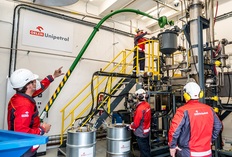- The project will explore chemical recycling over the next three years.
- The testing technology cost CZK 18 million, with CZK 7 million from the Ministry of Industry and Trade.
- The research project cost CZK 72 million, with CZK 50 million from the Technology Agency of the Czech Republic.
- The project aims to process waste plastics and rubber into chemicals like ethylene, propylene, butadiene, and benzene.

Project Overview
ORLEN Unipetrol has launched a pyrolytic testing unit at its Litvínov chemical plant to explore chemical recycling of waste plastics. The project aims to integrate this recycling method into standard production within three years, aligning with EU policies and promoting a circular economy.
Plastic Waste in the Czech Republic
The Czech Republic produces over 400,000 tonnes of plastic waste annually, with only 37% recycled and 18% used for energy. The new chemical recycling technology could significantly reduce the amount of unused plastic waste.
Technology and Goals
Chemical recycling through pyrolysis involves thermal decomposition at elevated temperatures, converting waste plastics into hydrocarbons for reintegration into petrochemical production. This process aims to lower the carbon footprint and make better use of existing plastic waste.
Investment and Collaboration
The testing technology cost CZK 18 million, with CZK 7 million funded by the Ministry of Industry and Trade. The overall research project cost CZK 72 million, with CZK 50 million from the Technology Agency of the Czech Republic. ORLEN Unipetrol collaborates with the University of Chemistry and Technology in Prague and its own Centre for Research and Education.
Future Applications
The project will develop industrial-scale technology to process waste plastics and rubber from tyres into basic chemicals like ethylene, propylene, butadiene, and benzene. These chemicals will be used to produce final petrochemical products such as polyethylene, polypropylene, and polystyrene, and to enhance motor fuel production.

